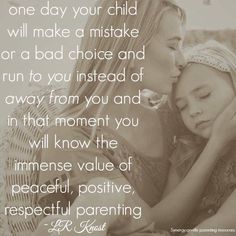Children have a lot to learn from their parents and caregivers. Perhaps the most important lesson we can teach them is learning to do the right thing because they want to, not because they feel that they have to. This means that instead of punishing or shaming your children for “bad” behaviours, you talk to them. No shame, no yelling, no punishment, no threats, just communication.
I know it is hard to shift away from the belief that punishment is the right course of action for undesirable behaviour, but think for a second about what you are teaching a child when you punish them for “bad” behaviours. You are teaching them that they should do the right thing not because it is what they want to do, but because of the consequences they will receive. This not only gives children an ulterior motive to doing the right thing, but sets them up to be dependent upon adult approval. I’ve seen children who act one way around adults only to act the complete opposite once they are out of sight. I’ve also seen children so desperate for the approval of adults and afraid of punishment, that they will go to great lengths to achieve this by constant tattle tailing, lying, and blaming of others for their behaviours.
So what should you do the next time your child throws a toy, hits their sibling, or purposely defies what you have said?
- Keep calm and take a deep breath-it’s hard to communicate with our children when we aren’t calm ourselves.
- Stop the undesired behaviour– especially if it an issue of safety.
- Stay firm on the boundary you have set- I.e “I can’t let you hit your brother,” “I need to hold your hand on the road to keep you safe.”
- Help your child come back to a place of calm and be prepared to listen to their big emotions- I.e “I’m here for you” “I hear that you are having a tough time,” “I know it’s hard when you can’t do what you want.”
- Talk it through with your child when they are ready. Keep it simple!- Name the behaviour they displayed, explain why it wasn’t okay, teach them what to do next time. I.e “the reason mummy said you can’t hit your brother is because it hurts him and doesn’t make him feel safe. He likes gentle touches,” “We don’t throw toys when we are frustrated because they could break or hurt someone, instead we could move away to calm down or ask for help from an adult,” “I had to stop you from riding your scooter because you kept going onto the road and that wasn’t safe. When we are ready to be safe on the sidewalk we can ride it again”
By doing this you aren’t letting your child get away with “bad” behaviours, instead you are letting them know that you are there for them, and that it’s normal to make mistakes and have emotions. You are also providing them with the appropriate tools to use next time similar problems arise. This way your child will know how to safely and appropriately deal with emotions and feelings, and understand why certain things are okay and not okay to do.
It may be hard to move away from a cycle of punishment and shame for your child’s undesired behaviours. I know I struggle daily to move away from these parenting techniques, especially as these can provide the quickest changes to your child’s behaviour. But I always try to remember, when I hear my voice rising or a threat come out of my mouth, that the only thing I am doing when I parent this way is letting my children know that it is not okay to make mistakes, to hide their mistakes from me, and to do the right thing out of obligation and the fear of consequences. When I parent through punishment I am not giving my child the tools needed to deal with difficult situations or emotions. Nor am I setting them up to think for themselves and problem solve to discover the right thing to do on their own when they’re older. I know I do not want my sons, when they’re teens, to only do the right thing when it benefits themselves. I also don’t want them to hide their mistakes from me, nor do I want them pressured into doing things because they seek the approval of others. I want them to do the right thing because they want to, and because they were provided the appropriate tools to problem solve and deal with tricky situations when they were younger. It all starts in these early years.


